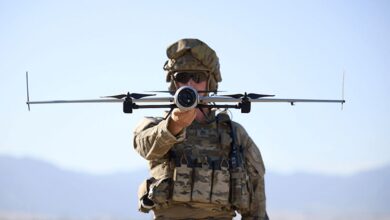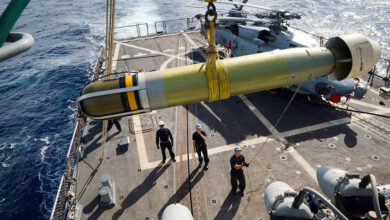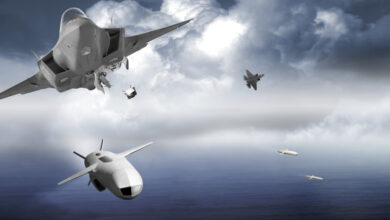
The daily horrors fill our screens: hospitals and apartment buildings intentionally bombed; freezing elderly and children hiding in subway stations; families separated at borders; Russians fearful for family members in Ukraine’s east and for family members in Russian uniform.
It is right to show the world all the war crimes, the enormous and pointless destruction, and Ukrainians from all walks of life fighting with wholehearted courage that jaded consumerist societies had forgotten was possible.
But in all the details of these daily reports – of cluster bombs and incendiary weapons, of people trying to escape cities without water – it is easy to lose sight of the biggest implications of Russia’s war on Ukraine.
The most basic one is simple and shocking: even after Joseph Stalin’s terror-famine in Ukraine, the millions killed by Adolf Hitler, and the Soviets’ four-decade reign of terror across eastern Europe, still Europe’s leading nations will not fight to stop the same kind of radical evil from triumphing again.
The monstrous result is like a crowd of people watching a big man slowly bludgeon a boy to death over many hours while occasionally throwing him a wooden shield and issuing statements condemning his beating.
Europe’s Cowardly Leaders
Major EU nations will do almost anything but fight Russian forces, including robust economic sanctions and sending stronger defensive weapons to Ukrainians. This aid is welcome, but it is far too little when thousands of people are being butchered daily within their own continent.
Stingers ✅ Thanks to the @LithuanianGovt, Lithuanian people&personally to great friend of 🇺🇦 @a_anusauskas for the aid! Ukrainian & Lithuanian relations are very close&have lasted for many centuries. I appreciate our centuries-old friendship&strength support of each other!🇺🇦🤝🇱🇹 pic.twitter.com/zf8sNj9Oe7
— Oleksii Reznikov (@oleksiireznikov) February 13, 2022
They knew what Vladimir Putin would do: he bombed civilians to oblivion in Chechnya, Georgia, and Syria as well.
Yet Europe’s cowardly leaders are not even willing to risk a handful of fighter pilots to stand up a no-fly zone — although they would find many willing volunteers within their own air forces, men and women with far more decency than their puerile political leaders.
It is as if all the lessons of 20th-century history meant nothing, and all the victims died in vain. As in Bosnia and Kosovo, when then-British Prime Minister John Major and German Chancellor Helmut Kohl refused to fight, leaving it to then-US President Bill Clinton to stop mass slaughter within Europe, today’s leaders of Germany, France, Britain, Spain, and Italy have utterly failed the test once again.
The only difference is that the stakes are orders of magnitude greater this time.
Larger Geopolitical War
In this sense, whether Putin eventually occupies all of Ukraine’s cities or not and whatever concessions he extracts before leaving Ukraine in burning ruins, he has already won the larger geopolitical war.
Putin has shown the whole world that leading democracies are faithless friends who will not fight when that is the only adequate response. Current and would-be dictators will be emboldened. China will probably invade Taiwan within a few years.
Thus, European politicians, always running to the toothless UN in search of some misconceived patina of legitimacy, have now advertised that the UN Charter is utterly meaningless.
Its core principle, which was invoked to authorize military force to reverse Saddam Hussein’s 1991 invasion of Kuwait, says that borders cannot be changed by unilateral force.
Its second principle is the duty to honor treaties like the Budapest Memorandum in which Russia promised to respect Ukraine’s 1994 borders in exchange for Ukraine handing over the nuclear weapons that might have saved its people from their present fate. Any lingering hope that these principles matter has been shredded by the execrable timidity in London, Paris, Berlin, Rome, and Madrid.
Of course, the protest marches to “support Ukraine,” the divestment campaigns by CEOs, and the well-meaning fundraisers to send humanitarian aid are all better than nothing. But focusing attention on them only distracts from the real heart of the matter, namely the fatal sin of deciding that no cost in Ukrainian lives is too high a price to avoid a brief shooting war with Russia.
The message is clear: neither Ukraine nor the most basic human rights principles are worth risking a single casualty from European armed forces.
Nuclear Risk
Of course, Europe’s leaders keep trying to use nuclear risk to rationalize their dereliction. This excuse rings hollow for two reasons.
First, Putin knows that trying to use even small tactical nukes would bring a nearly-instant end to his reign at the hands of his own deputies.
Second, if any “escalation” with Russia is too great a risk in Ukraine, the same would apply if (say) Putin invaded a NATO member like Latvia. In that case too, Norway’s prime minister could say that it would be “irresponsible” to risk a larger war with Russia: sadly, rather than risk a nuclear conflict, we will just have to let Latvia go.

Putin will realize that if they are that unwilling to risk any escalation, then really the NATO pact means nothing for smaller east European members.
No matter what, Europe’s main leaders will keep deceiving themselves that “negotiations” and “diplomacy” are a viable alternative even without any hard military threat to back them up.
In other words, in the argument that we cannot risk fighting Russian forces because Russia is a nuclear power, NATO membership is irrelevant. Western nations only won the Cold War because they were willing to fight if necessary.
Will to Fight
The resulting ethical abyss cannot be covered up with posturing on social media proclaiming that “we love you, Ukraine.”
The humanitarian aid would not be needed if only the European NATO nations had provided a few thousand troops, armor, and air cover for Ukraine — for then Putin probably would not have dared to invade. And if he still did, in that scenario, Russian forces would have been swiftly defeated.
This should now be clear, given how well Ukrainians have fought on their own. Backed by an air force to stop Russian bombers, they would already have won.
Imagine what such a total defeat for Putin’s invasion would have meant for the world. After this triumph for democracy and human rights, within weeks, the tyrant of Belarus would probably be where he belongs – hanging from a gibbet in Minsk – and generals in Sudan would be making hasty plans to restore a civilian government. Even in Beijing, second thoughts about Taiwan would be likely.
Europe might have lost 100 soldiers who had volunteered to defend Ukraine — and to prove that democrats have the will to fight when necessary.
West’s Fateful Failure in Ukraine
Now this invaluable opportunity has been lost in a mire of Ukrainian blood because ordinary citizens throughout advanced democratic nations are so confused in their thinking about war and unequipped to understand what military inaction means in high-stakes contexts such as Putin’s total war on Ukraine.
Misled by decades of twisted pacifist ideology, they imagine that millions of refugees, hundreds of billions in physical damage, deep trade boycotts that will impoverish millions of Russian, and a worldwide recession caused by ineffective sanctions are somehow better than any level of direct war with Russia.
That kind of simplistic thinking that cannot recognize the inherent value in that noble stance – in standing up for humanity – is the root of the West’s fateful failure in Ukraine. As we already saw in Syria, it ensures that mass murder will go unchecked, and belief in the power of democratic nations to defend each other will decline even further.
In sum, Europe’s fateful choice to abandon Ukraine may ensure that tyranny will control most of the world within 50 years.
Europe’s leaders have not only betrayed the people of Ukraine; their manifest weakness now imperils the entire future of humanity.
 John Davenport is Professor of Philosophy and Peace & Justice Studies at Fordham University.
John Davenport is Professor of Philosophy and Peace & Justice Studies at Fordham University.
The views and opinions expressed here are those of the author and do not necessarily reflect the editorial position of The Defense Post.
The Defense Post aims to publish a wide range of high-quality opinion and analysis from a diverse array of people – do you want to send us yours? Click here to submit an op-ed.











